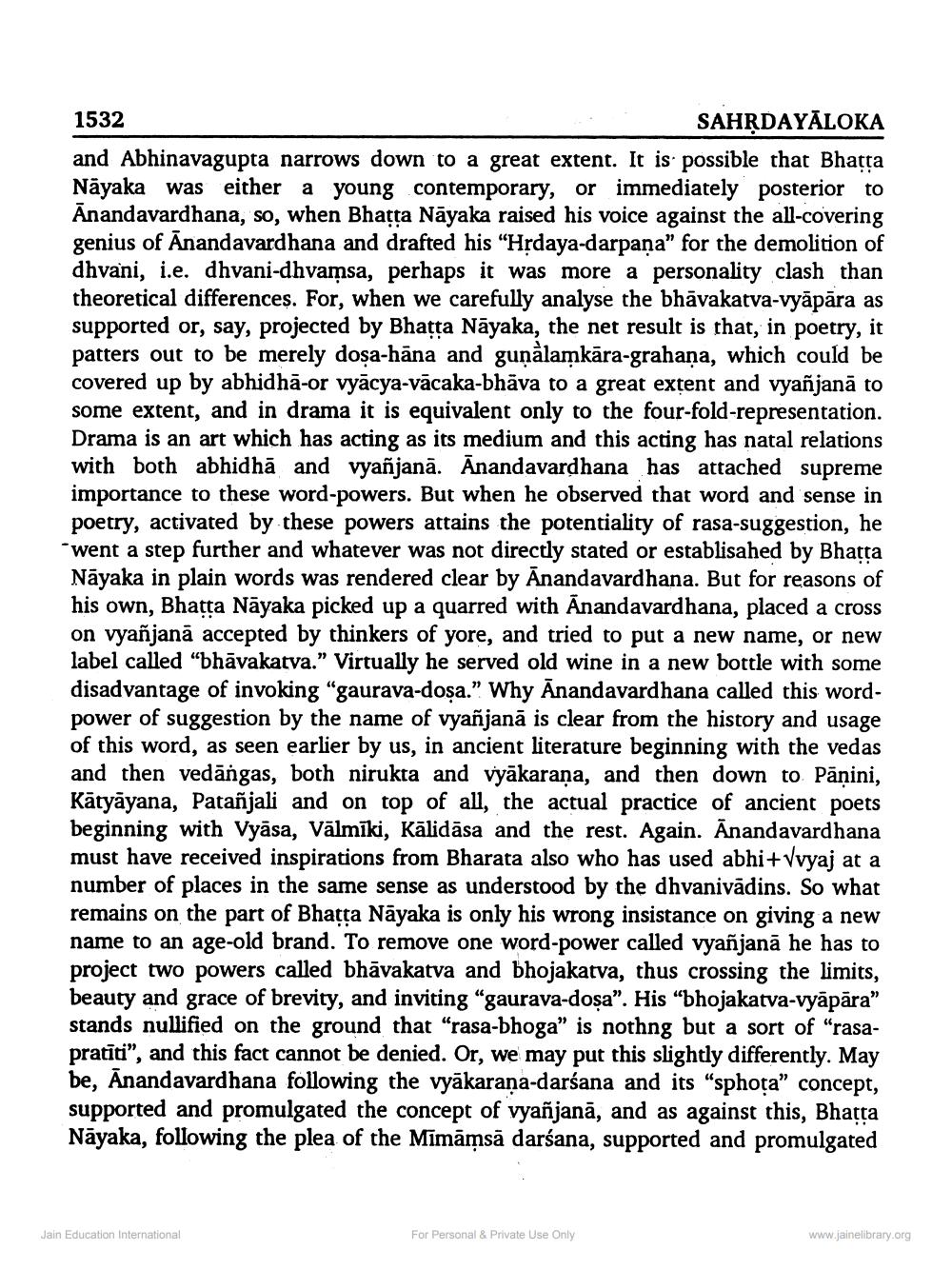________________
1532
SAHṚDAYĀLOKA and Abhinavagupta narrows down to a great extent. It is possible that Bhatta Nayaka was either a young contemporary, or immediately posterior to Anandavardhana, so, when Bhatta Nayaka raised his voice against the all-covering genius of Anandavardhana and drafted his "Hṛdaya-darpana" for the demolition of dhvani, i.e. dhvani-dhvamsa, perhaps it was more a personality clash than theoretical differences. For, when we carefully analyse the bhavakatva-vyāpāra as supported or, say, projected by Bhaṭṭa Nayaka, the net result is that, in poetry, it patters out to be merely dosa-hana and guṇalamkāra-grahaṇa, which could be covered up by abhidha-or vyācya-vācaka-bhāva to a great extent and vyañjana to some extent, and in drama it is equivalent only to the four-fold-representation. Drama is an art which has acting as its medium and this acting has natal relations with both abhidha and vyañjana. Anandavardhana has attached supreme importance to these word-powers. But when he observed that word and sense in poetry, activated by these powers attains the potentiality of rasa-suggestion, he "went a step further and whatever was not directly stated or established by Bhatta Nayaka in plain words was rendered clear by Anandavardhana. But for reasons of his own, Bhaṭṭa Nayaka picked up a quarred with Anandavardhana, placed a cross on vyañjanā accepted by thinkers of yore, and tried to put a new name, or new label called "bhāvakatva." Virtually he served old wine in a new bottle with some disadvantage of invoking "gaurava-dosa." Why Anandavardhana called this wordpower of suggestion by the name of vyañjana is clear from the history and usage of this word, as seen earlier by us, in ancient literature beginning with the vedas and then vedängas, both nirukta and vyākaraṇa, and then down to Pāṇini, Katyāyana, Patanjali and on top of all, the actual practice of ancient poets beginning with Vyasa, Välmīki, Kalidasa and the rest. Again. Anandavardhana must have received inspirations from Bharata also who has used abhi+√vyaj at a number of places in the same sense as understood by the dhvanivādins. So what remains on the part of Bhatta Nayaka is only his wrong insistance on giving a new name to an age-old brand. To remove one word-power called vyañjanā he has to project two powers called bhāvakatva and bhojakatva, thus crossing the limits, beauty and grace of brevity, and inviting "gaurava-dosa". His "bhojakatva-vyāpāra❞ stands nullified on the ground that "rasa-bhoga" is nothng but a sort of "rasapratiti", and this fact cannot be denied. Or, we may put this slightly differently. May be, Anandavardhana following the vyakaraṇa-darśana and its "sphota" concept, supported and promulgated the concept of vyañjanā, and as against this, Bhatta Nayaka, following the plea of the Mimāmsā darśana, supported and promulgated
Jain Education International
For Personal & Private Use Only
www.jainelibrary.org




